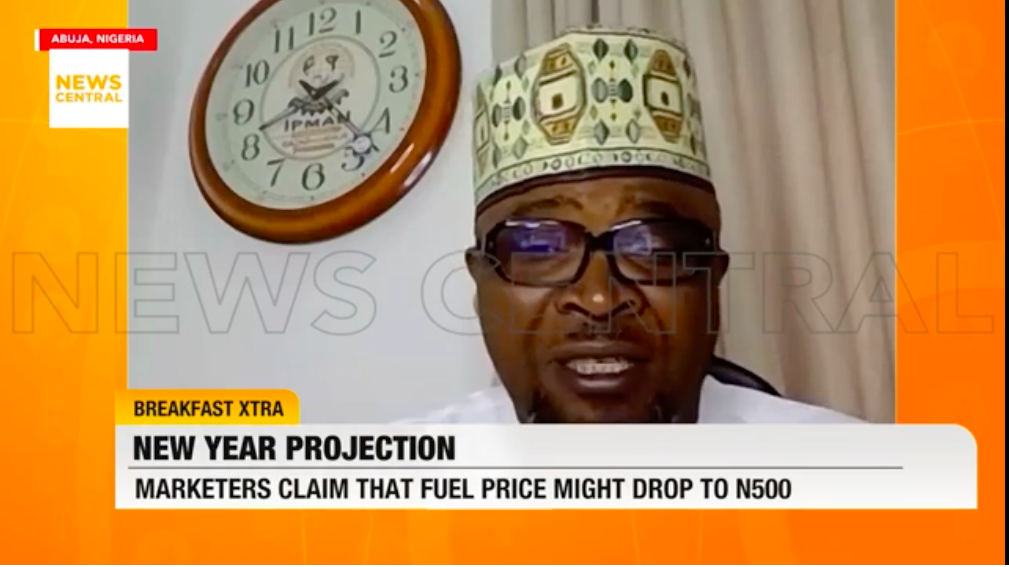According to predictions made by fuel marketers in a recent discussion about the expected reduction in petrol prices in Nigeria, prices may drop to N500 in 2025.
A steady currency rate, declining global oil prices, and rising fuel imports are some of the economic factors that support this positive outlook.
The Independent Petroleum Marketers Association of Nigeria (IPMAN)’s National Publicity Secretary, Ukadike Chinedu, stated on Saturday’s Breakfast Xtra on News Central TV that more domestic refinement of petroleum products will result in lower prices.
An important aspect of the discussion is the deregulation of the oil industry. To make the Nigerian market more competitive, the government plans to eliminate subsidies. There are worries about the immediate effects on customers who have been used to subsidised rates, even though this change would promote investments in regional distribution and refining.
“The economy has been deregulated; subsidies have been eliminated, and investors are flocking in since the government is no longer controlling or subsidising petroleum products,” he said.
Inflation rates generally may decline as a result of lower petrol prices, which would especially impact the costs of goods and services that depend on transportation.
However, because of the delay between price changes and market responses, it is unclear when and how much of these effects will occur. It will be necessary to watch the intricate relationship between inflation and fuel prices.
“The events of the past eight to ten months have demonstrated that the closure of petroleum product imports and the expansion of local refineries can result in a decrease in prices.
“We know that when Dangote opened his refinery, the price of petrol was increased to about 1,500 Naira and 1,800 Naira in some locations. To maintain our domestic transportation, Nigeria was heavily reliant on the importation of petroleum products, and independent merchants at the time relied on the Nigerian National Petroleum Company Limited (NNPCL)’s products. We are only able to sell when NNPCL provides us with a product.
As a result, it becomes standard practice for independent marketers to obtain even 45,000 litres of petroleum products at the petrol station. Petroleum products are experiencing what is known as prolonged scarcity; one day you will have supplies, and the following day there will be shortages.”
To manage the oil industry and assist regional refineries, the government must take the initiative. Ensuring that the economy as a whole benefits from lower petrol costs will require consistent regulation and effective strategies. Additionally, lowering reliance on foreign currencies and localising transactions can improve economic resilience and stabilise prices.
When asked if there were any advantages to the 500 Naira fuel price, Ukadike replied that 45,000 litres of PMS could be purchased for 8 million Naira or more and that marketers could sell five to six trucks in a week or even ten trucks in a month. However, he added that the purchasing habits of consumers have changed since petroleum products used to cost between 900 and 1,000 Naira.

As a result, he implied, commuters are no longer visiting the petrol station to fill up their tanks.
Currently, the majority of marketers are content as the product is declining. You can even witness someone repeating, “Give me 50 litres, give me 20 litres,” while the cost is significantly decreasing.
“We previously paid around 50 million naira on these goods; the enormous sum is now declining by more than 40 million naira. We are hoping that it will keep declining so that we won’t have to pay too much for it. As you are aware, when the cost of funds is high, the price of petrol products also rises. For this reason, we stated that we would be pleased if this product even decreased in price by less than 500 naira.
“The competition is sporadic; Dangote wants to stay in business and wants marketers to purchase from them.
“The NNPCL has been battling valiantly to make sure that all of its refineries are operating to compete and eradicate the monopoly problem, which the government fears.”
According to the IPMAN Publicity Secretary, forecasts for petrol price cuts are greatly impacted by economic factors, such as the Naira’s stabilisation and changes in the world oil market. The viability of reaching the anticipated price reduction would depend on the interaction of global prices and local supply and demand. Although domestic refining capabilities are seen with optimism, price instability may continue due to reliance on international markets.
He pointed out that other refineries are attempting to update their facilities to refine PMS.
“When everything is finished, the developments in the oil and gas sector will be identical to those in the telecommunications sector.”
One of the main obstacles to the efficient distribution of petrol in Nigeria is transportation and logistics. Fuel transportation costs from refineries to filling stations have a big influence on retail prices. To achieve reduced pricing and guarantee a steady supply, infrastructural improvements are required, such as fixing pipes and improving transportation networks.
The debate over petrol pricing in Nigeria brings to light the intricate interactions between market forces, consumer behaviour, and economic issues. Despite optimistic pricing forecasts, there are still several obstacles in the way of sustainability, such as logistical problems, the possibility of smuggling, and the requirement for strong government intervention.
A more stable and easily accessible petrol market may benefit regular Nigerians and lessen some of their current financial struggles as stakeholders negotiate these choppy waters.
To achieve a more promising economic future for Nigeria, it will be essential to maintain constant communication and make a commitment to tackling the underlying reasons for price volatility.


